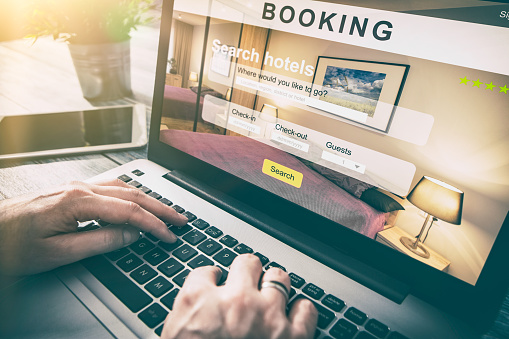A hotel booking engine is a software application that securely processes direct online reservations through a hotel website. It’s a crucial component in the buying cycle where travelers can find and select a room from a hotel to make a reservation online using a credit card. It’s basically the shopping cart for a hotel website.

Syncing a booking engine with a hotel website gives hoteliers the chance to diminish their reliance on online travel agencies (OTAs) by driving and converting more direct bookings without having to pay commission fees and relenting valuable customer information.
The ability to make a hotel reservation online has become increasingly important among guests looking to instantly book a hotel room and is a feature that even the smallest hotels shouldn’t ignore. If you’re not taking advantage of an online booking engine, then you’re potentially missing out on hundreds of travelers looking for a place to stay in your area.
Find out how an online booking engine works, its benefits, and the features to look for in a hotel booking engine.
How does a hotel booking engine work?
Before we move ahead to the benefits and features to look for in a hotel booking engine, let’s first look at how a hotel booking engine works.
An online hotel booking engine operates through your hotel’s website by processing secure, direct online reservations. The booking engine is where travelers will complete the online reservation process after selecting their travel dates, the number of guests, and the desired room type. Rates and room availability will display in real-time, so guests are selecting from the most up-to-date information.
A booking engine typically includes a hotel’s inventory (rooms, suites, condos, etc.), images of the inventory, and real-time rates that visitors can pick based on their selected travel dates. Other features may include special promotions and deals that your hotel offers, add-ons, and available room upgrades.
Once a booking is complete, the data provided by the guest will be sent through the Property Management System (PMS) and can then be retrieved by the hotel to manage.
How can hotel websites benefit from using a hotel booking engine?
I’m glad you asked! There are plenty of advantages to using an online booking engine on your hotel’s website. Below are just a handful of benefits that you can find in a hotel booking engine.

First:
Having a booking engine synced with your hotel’s website promotes a seamless transition through the traveler’s buying journey.
Let’s say a traveler has landed on your hotel’s website after sifting through the results on the search engine. There, they admire the photography, amenities, and room types your hotel has to offer. When they make the decision that your hotel has all the bells and whistles they’re looking for, they can quickly and securely book instantly through the online booking engine without leaving your hotel website’s domain.
It gets better:
Your booking engine works with a PMS to display real-time best available rates, specials, and available inventory to prospective guests, all without having to manage multiple systems. Typically, these categories can also be used as a search feature on the booking engine, so visitors can search by dates, unit types, specials, and occupancy to find the best accommodations to suit their needs. This makes for a simple stress-free booking process for guests.
Also:
When those travelers book directly on your website through the booking engine, not only is the information they provide stored safely and securely, but that information is now yours to use in the future to increase repeat guests and build customer loyalty.
Don’t forget:
Including a booking engine on your website can also have a major impact on third-party websites like Facebook or ad platforms like Google Hotel Ads. What does this mean? Travelers can make an online reservation directly through these platforms with proper integration, giving you another step up above the competition.
What features should you look for in a hotel booking engine?
Not all booking engines are created equal.
That’s why it’s imperative that you use a booking engine that can accommodate the services your hotel offers and includes the functions and features that can store and promote your hotel’s inventory.
While there are many features to consider for a booking engine, there are a few that you need to keep top-of-mind, including:
- Mobile-friendliness
- The ability to be embedded directly into your existing website so the entire booking process takes place within your own domain
- Integration and compatibility of analytics software like Google Tag Manager and Adobe Analytics
- Upsell and urgency opportunities through special promotions, packages, and room upgrades during the buying cycle
As mentioned previously, there are many features to consider before adding a booking engine to your hotel’s website. Get more details about the hotel booking engine features you should know.
The Complete Rundown
Booking online has become the easiest, quickest, and most convenient way for travelers to reserve a hotel room. Not only does including a booking engine on your website make the traveler buying process seamless, but using a responsive, fully integrated booking engine can increase direct bookings through your hotel website while reducing your reliance on OTAs.
The benefits of optimizing an online booking engine with your hotel’s website are abundant. Doing so is taking a step in the right direction for taking control of your occupancy, promoting your hotel, and leaving a positive impression on travelers.
Got Direct Bookings?
Contact Fuel today to start increasing your hotel’s direct bookings. Get a complimentary marketing evaluation and a free consultation.







